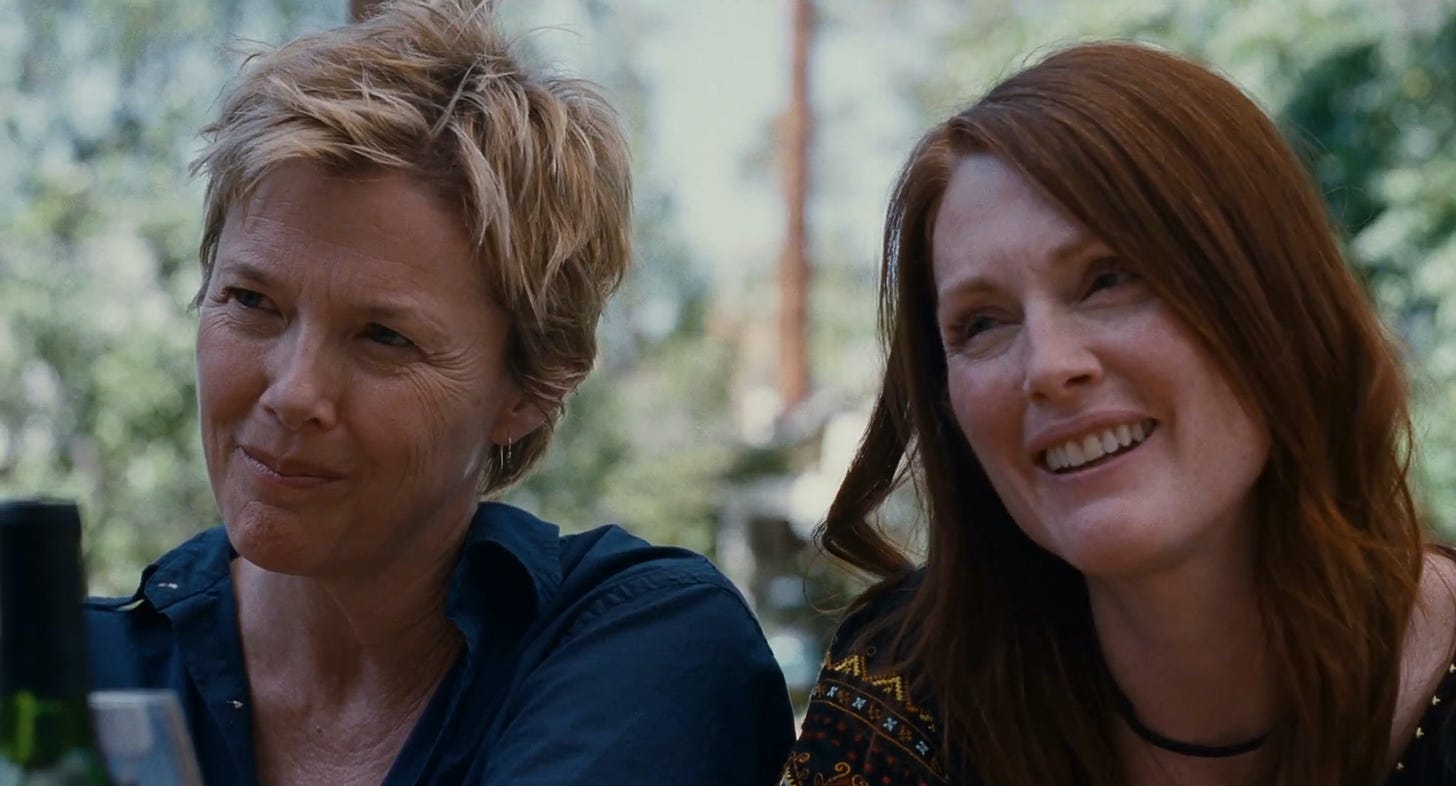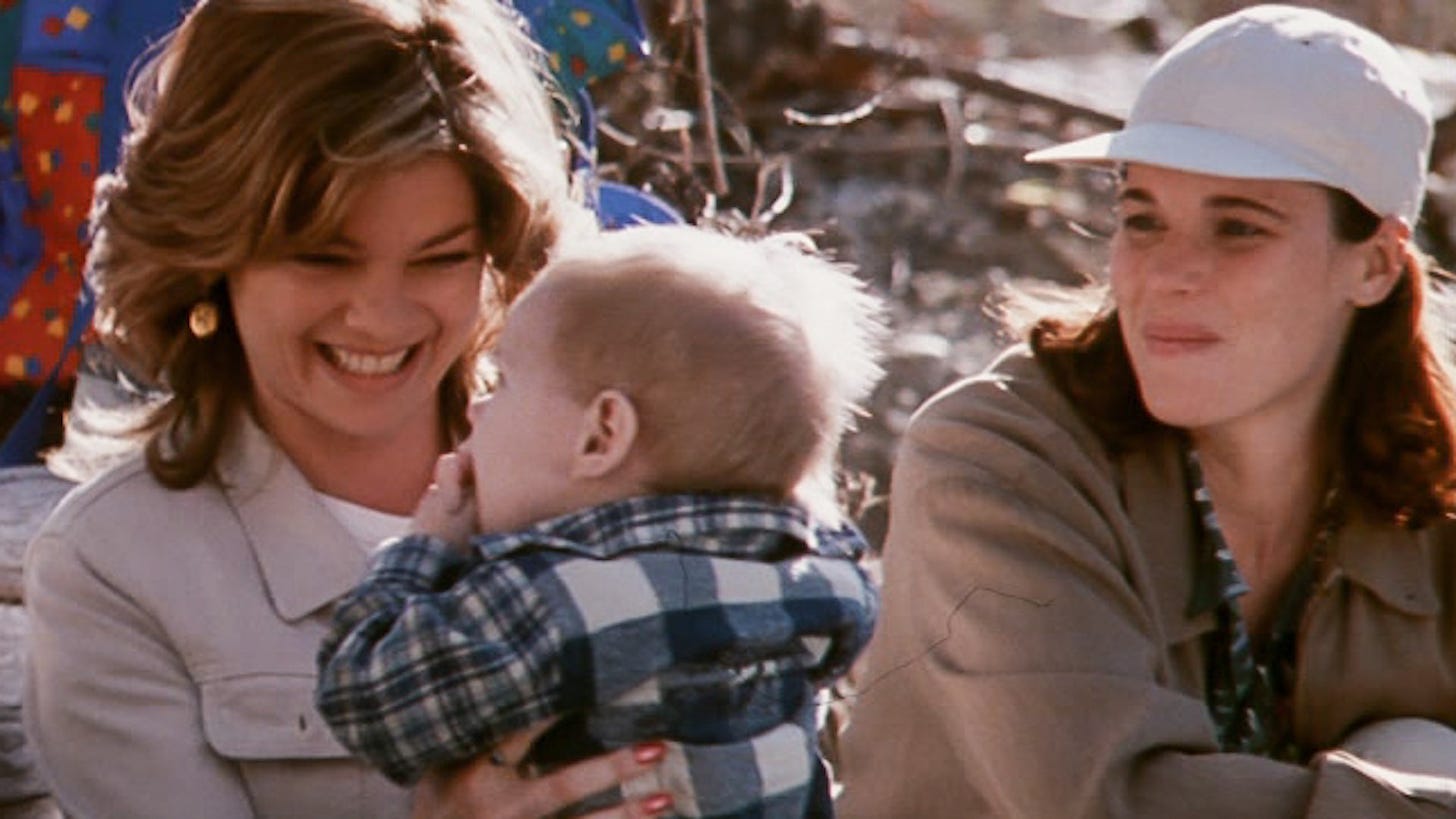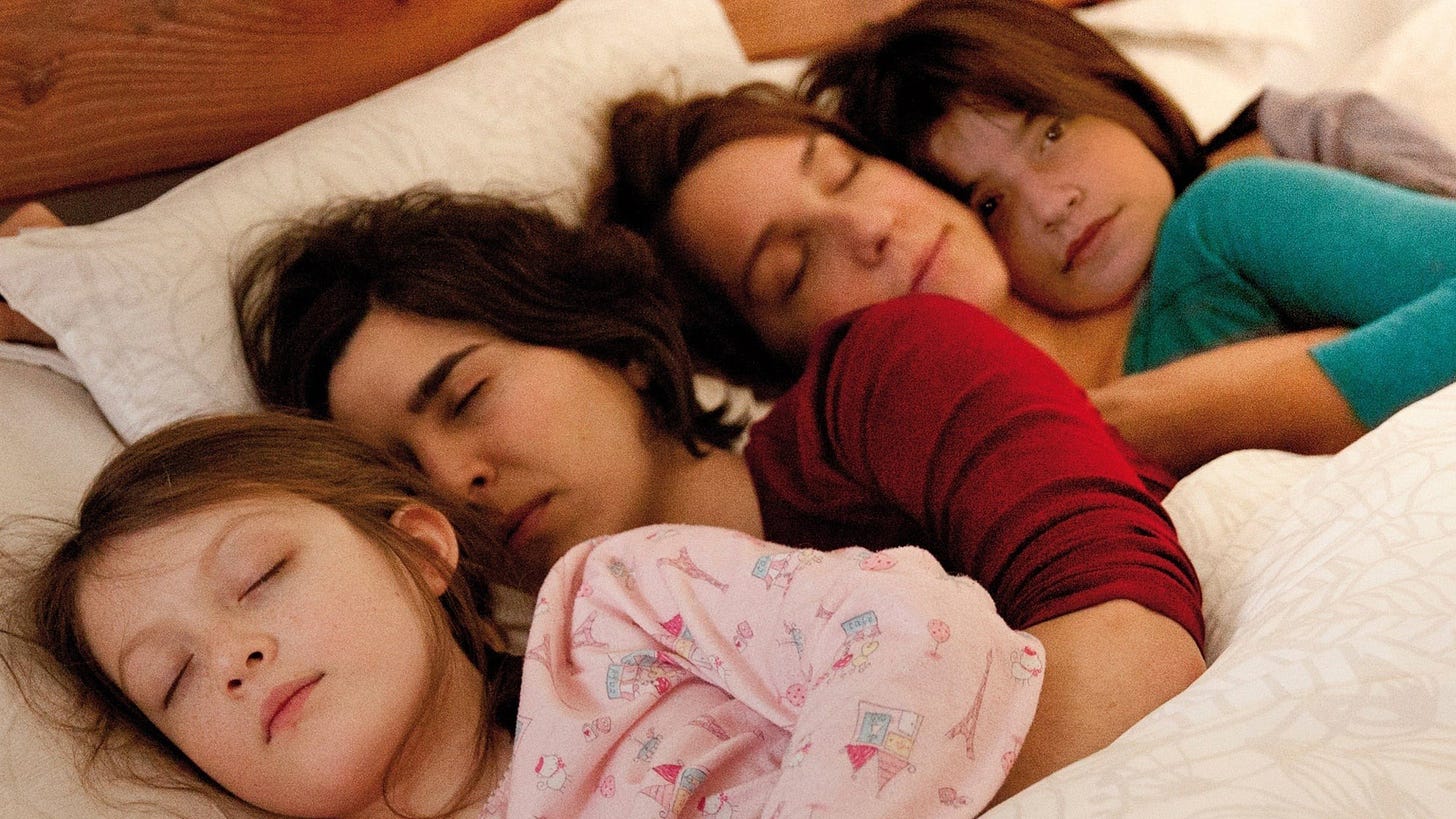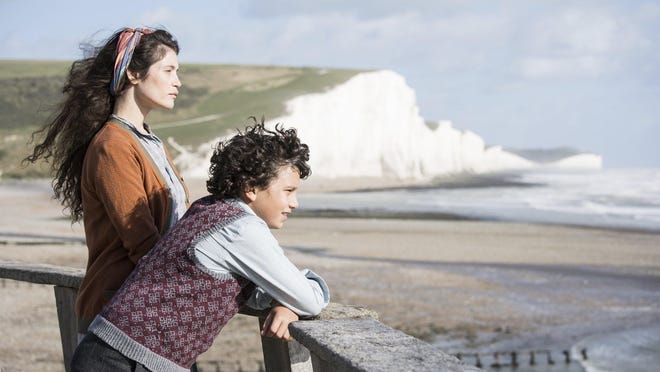This is the Sunday Edition of Paging Dr. Lesbian. If you like this type of thing, subscribe, and share it with your friends. Upgrade your subscription for more, including weekly dispatches from the lesbian internet, monthly playlists, and a free sticker.
For the next month – until August 7 – I will be donating all proceeds from new paid subscriptions to Operation Olive Branch, a database that collects fundraisers for families seeking aid in Gaza. If you don’t want to subscribe, you can donate on your own. Let’s make an impact!
For many in the world, the idea of lesbian motherhood is still a contradiction in terms, or at least an anomaly. Pop culture has slowly caught up to the reality that lesbians can and do have children, and that these families can manifest themselves in a variety of ways, but many stories remain untold.
Lesbian motherhood has emerged as a topic of interest on several television shows, perhaps most notably in ABC Family’s The Fosters, which follows a lesbian couple and their kids (including four adopted children). Grey’s Anatomy depicts sapphic fan-favorites Callie (Sara Ramirez) and Arizona (Jessica Capshaw) raising a child together, while The L Word follows Bette (Jennifer Beals) and Tina’s (Laurel Holloman) journey to motherhood starting in its first season.
In film, depictions of lesbian mothers have been few and far between. Nonetheless, I’m interested in defining a sort of canon of lesbian motherhood as it has been captured on the big screen. What have been the dominant narratives thus far? What has yet to appear?
Unsurprisingly, lesbian mothers first began to emerge on film alongside the so-called lesbian baby boom, which started in the 1980s. Debra Chasnoff and Kim Klausner’s 1985 documentary Choosing Children: Launching the Lesbian Baby Boom (which you can watch on Kanopy), focuses on six “lesbian-headed families,” exploring how they navigate the challenges (and joys) of motherhood in a society that isn’t built for them.
The film is filled with numerous fascinating insights, including one incredible anecdote about the best vessel for storing sperm during at-home insemination. (Spoiler: it’s marinated artichoke jars, because of their wide rim.) The 2021 HBO documentary series Nuclear Family, which tracks lesbian moms in the 1980s, follows a complex legal battle that threatens the family unit. Both documentaries are at least in part concerned with the legality of these families, as all the lesbians in Choosing Family were forced to circumvent the medical and/or legal establishments in order to have children.
For the next several decades, most filmic representations of lesbian mothers were focused on custody battles. The 1996 ABC TV film Two Mothers for Zachary (which I’ve written about before) tells the real-life story of a custody battle between a lesbian trying to raise her son with her partner and her mother, who wants custody of her grandson. Despite its occasionally cheesy TV movie aesthetic, the film is ultimately compassionate towards the lesbians, and encourages viewers to sympathize with their plight.
In 2001, Lifetime released What Makes a Family, also based on a true story. Brooke Shields and Cherry Jones play Janine and Sandy, two women who have a child together. When Sandy dies of Lupus, Sandy’s parents sue for custody, so Janine hires a lawyer (played by Whoopi Goldberg) to plead her case. Similar to its predecessor, What Makes a Family works hard to prove that lesbians deserve respect and agency in their lives. The 2006 documentary Mom’s Apple Pie: The Heart of the Lesbian Mothers’ Custody Movement (also available on Kanopy) takes a less dramatic approach, interviewing several moms and children about their experiences.
2010 saw the arrival of the two most famous lesbian movie moms to date. In Lisa Cholodenko’s The Kids Are Alright, Annette Bening and Julianne Moore play Nic and Jules, a lesbian couple who have been together for twenty years. When their two teenage children, Joni (Mia Wasikowska) and Laser (Josh Hutcherson), go behind their backs to meet their biological father, Paul (Mark Ruffalo), things start to fall apart. The movie throws every lesbian stereotype at the wall – lesbian bed death, being obsessed with Joni Mitchell – but as a lesbian mom herself, Cholodenko is clearly coming at these whacky situations from a place of love, rather than derision.
To be sure, The Kids Are Alright isn’t exactly great PR for lesbian moms, nor does it always make you want to have a lesbian mom (they might sing “Both Sides Now” at the dinner table or ask you to ‘feel your feelings’). At the same time, movies don’t need to be good PR for the communities they’re representing – that’s not what art is for. Despite the oftentimes frustrating cheating plotline involving the kids’ bio dad, the film ultimately illustrates that this family loves each other deeply, and though they may have different struggles than other families, we can all relate to their ups and downs.
In the decade since The Kids Are Alright premiered, several international films depicting lesbian moms arrived on the scene. 2016’s Rara follows a Chilean family and the complications of their daily lives. The film is mainly told from the perspective of 13-year-old Sara (Julia Lübbert), who is happy to have two moms in the form of Paula (Mariana Loyola) and her girlfriend Lía (Agustina Muñoz). When the “secret” of their living arrangement gets out at school, things become difficult for Sara and her younger sister, and their father decides to sue for custody. Based on a real-life custody case like the films I mentioned earlier, Rara sets itself apart with its unique perspective and the slice-of-life quality of the filmmaking, allowing us to see this family through Sara’s eyes.
2018’s Mom + Mom doesn’t technically follow lesbian mothers, but rather two women on their journey to becoming parents. Karole (Linda Caridi) and Ali (Maria Roveran) are an Italian couple hoping to raise a child together. Because they can’t legally do IVF in Italy, they have to fly to Barcelona on numerous occasions to increase their chances of getting pregnant. Part comedy, part drama, Mom + Mom is filled to the brim with hijinks and complications, though these hardships never overpower the film’s inherent optimism.
In 2023’s Housekeeping For Beginners, directed by Of An Age filmmaker Goran Stolevski, a North Macedonian family comes together in a rather unconventional manner. When Dita (Anamaria Marinca) is forced to raise her girlfriend’s children despite never wanting to be a mother, things are far from smooth in the household. Only adding to the confusion is the fact that one of their housemates, Toni (Vladimir Tintor), a middle-aged gay man, brought his 19-year-old lover home with him, and he’s now part of the family unit too. Dita and Toni find themselves playing mother and father to two children who desperately need support, asking the same question Lifetime asked in 2001: What makes a family?
In the lesbian film canon more broadly, children appear every so often. In Jessica Swale’s 2020 film Summerland, the child character features more prominently than in other lesbian films. Gemma Arterton’s Alice is a hermit-like curmudgeon who wants nothing to do with children or people of any kind until she meets Frank (Lucas Bond), a child who will become more important to her than she could ever imagine. It’s a very heartwarming story, and there is no custody drama whatsoever despite the fact that it primarily takes place during WWII, a period when the notion of lesbian motherhood was all but unheard of.
In More Beautiful For Having Been Broken – directed by Nicole Conn, who you may know from films like Claire of the Moon and Elena Undone – a grieving FBI agent falls for a wiser-than-his-years child before she falls in love with his mother, and eventually, they become one happy family. I don’t have anything good to say about this movie – it very much leans into the magical and/or inspirational disabled person trope and is melodramatic to the point of incredulity – but it does depict lesbian and/or queer parents, I’ll give it that.
TÁR is another recent film where lesbian motherhood is a small but not insignificant part of the narrative. The most important element the film adds to our canon is the famous Cate Blanchett-uttered line “I’m Petra’s father,” in which Lydia Tár defends her daughter against a school bully. As a moment of self-determination, this brief but memorable scene tells us a lot about how Lydia sees herself as a lesbian and as a parent – both of which are rooted in her desire to wield power. At the very least, Lydia Tár is the most distinctive lesbian mother we’ve seen on the big screen so far.
There are numerous lesbian romance films in which one of the two main characters has a child, though this is often not a central part of the plot. Some examples include Tell It To The Bees, Raven’s Touch, Lovesong, Walk With Me, Lianna, Moonlit Winter, An Unexpected Love, and The Hours. In many cases, one of the women has a kid to illustrate the fact that she lived a different life before meeting her new love, which often includes having an (ex) husband.
In one of the most beloved lesbian films of the 21st century, Carol, the title character (also played by Cate Blanchett) has a daughter, and she becomes embroiled in a custody battle that puts an end to her relationship with Therese (Rooney Mara). Though her daughter doesn’t play a huge role in the film, the custody issue drives much of the narrative in the latter half and is the primary obstacle the women face. Being that the film is set in the 1950s, the issue of custody is pretty much inescapable.
With this overview behind us, we can get a better view of what has been represented in this film canon thus far. From a purely quantitive standpoint, there haven’t been that many films that depict lesbian mothers (though this piece is by no means an exhaustive list.) When you look at the narratives that have appeared on screen, there hasn’t been a huge range there either. Much of that has to do with the real-life context and struggles of lesbian mothers over the last several decades. Custody battles have been the primary plot points of on-screen lesbian mothers because they have been a significant feature of lesbian motherhood for as long as the concept (and indeed, the practice) has existed.
This is not to say that all of these films are outdated or unnecessary. Homophobia persists in legal systems and elsewhere, and it's still very difficult for lesbians to become parents in many parts of the world. Changing social norms around queerness and parenting may very well change the way these issues are depicted in film, which is famously slower to adapt to social norms than television. Or, perhaps the opposite progression is possible – films can be the impetus for social change, too. Either way, there’s plenty of room here for new stories, both for those looking to see their experiences represented and for those working to imagine new ways of living.
Can you think of any films I didn’t mention? If you’re a lesbian mom, have you ever felt represented by the movies? What about those of you who want to become lesbian moms?









One of my readers just reminded me of The Incredibly True Adventures of Two Girls in Love, which includes a pair of great lesbian mother figures! Definitely a good one to add to the list.
I remember Te Kids Are All Right in theaters. I wasn't even out at the time and now that my mom I'm like they really did just throw all of worst lesbian stereotypes at the wall and just used them all in this one film. But I love that cast so much! And it's a true darnedy, one of my favorite genres.